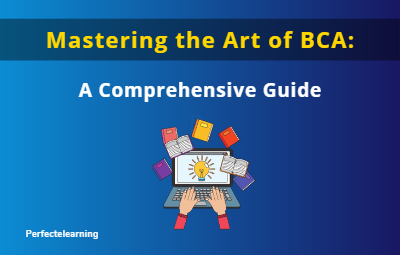

In today's digital age, where technology plays a crucial role in every industry, a Bachelor of Computer Applications (BCA) degree has emerged as a highly sought-after qualification. BCA equips students with the necessary skills to navigate the ever-evolving world of technology. This comprehensive guide aims to provide a detailed overview of BCA, its curriculum, essential skills, career opportunities, and tips for success. Whether you're a prospective BCA student or someone curious about the field, this guide will help you understand the art of mastering BCA.
Why is BCA important?
BCA is essential because it provides a strong foundation in computer science and equips students with skills that are in high demand in today's job market. As technology continues to advance, organizations require professionals who can develop software applications, manage databases, design websites, and ensure network security. BCA graduates are well-prepared to meet these industry demands and contribute to the digital transformation of businesses.
Benefits of mastering BCA
Mastering BCA offers numerous benefits. Firstly, it opens up a wide range of career opportunities in the IT industry. BCA graduates can work as software developers, database administrators, web designers, network administrators, system analysts, and more. Secondly, BCA provides a platform for continuous learning and growth. Technology is constantly evolving, and BCA graduates have the advantage of staying updated with the latest advancements. Lastly, BCA offers a rewarding and lucrative career path, with competitive salaries and opportunities for advancement.
Essential Skills for BCA
Technical skills: BCA students need a strong foundation in programming languages, database management, web development, and software engineering. Proficiency in languages like Java, C++, Python, and SQL is crucial.
Analytical and problem-solving skills: BCA graduates must possess analytical thinking and problem-solving abilities to identify and resolve complex issues in software development, data analysis, and system management.
Communication and teamwork skills: Effective communication and collaboration are essential in the IT industry. BCA students should develop interpersonal skills to work efficiently in teams and effectively communicate technical concepts to non-technical stakeholders.
Developing Programming Skills
Programming skills are fundamental in BCA. Students should focus on mastering programming languages like Java, C++, Python, and JavaScript. These languages are widely used in software development, web development, and data analysis. Online resources such as coding tutorials, coding challenges, and coding boot camps can help students enhance their programming skills.
Web Development and Design
Web development is an integral part of BCA. Students should gain proficiency in web technologies such as HTML, CSS, and JavaScript. Understanding responsive design principles, usability, and accessibility is essential for creating user-friendly websites. Online courses, web development frameworks, and practice projects can help students enhance their web development skills.
Industry Exposure and Internships
Industry exposure is crucial for BCA students to understand real-world applications of their skills. Participating in internships, workshops, and seminars can provide valuable insights into industry practices and trends. Internships allow students to apply their knowledge in a professional setting and build their professional network. Students should actively seek internships at IT companies and organizations.
Career Opportunities for BCA Graduates
BCA opens up diverse career opportunities in the IT industry. Graduates can work in software development companies, IT consulting firms, e-commerce companies, banks, and government organizations. Job roles may include software developer, database administrator, web designer, network administrator, system analyst, and IT project manager. BCA graduates can also pursue higher education and research in computer science-related fields.
Conclusion
Mastering the art of BCA requires a combination of technical skills, problem-solving abilities, and effective communication. BCA graduates possess a strong foundation in programming, database management, web development, networking, and project management. By developing these skills and continuously learning, BCA graduates can embark on a successful career in the IT industry. Remember, BCA is not just a degree; it's a pathway to endless possibilities in the digital world.
FAQs
Q. What is the duration of a BCA program?
A. The duration of a BCA program is typically three years, divided into six semesters.
Q. Can I pursue a BCA degree if I don't have a background in computer science?
A. Yes, many BCA programs accept students from various educational backgrounds. However, basic knowledge of mathematics and computer fundamentals is recommended.
Q. Are there any scholarships available for BCA students?
A. Scholarships for BCA students may vary depending on the educational institution and country. It's advisable to check with the university or explore external scholarship opportunities.
Q. How can I enhance my employability as a BCA graduate?
A. To enhance employability, focus on developing practical skills through internships, projects, and certifications. Building a strong portfolio and staying updated with industry trends can also improve job prospects.


